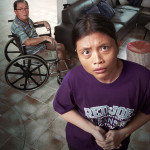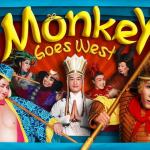“Grandmother Tongue”
Reviewer: Jocelyn Chng
Performance: 4 October 2017
I begin this review with a disclaimer. I am Teochew. Or, to be more exact, I am half-Teochew, and despite having only a limited understanding of the language, consider myself culturally Teochew. And I suspect that due in no small part to this, I have a personal, emotional bias towards Grandmother Tongue.
As part of W!ld Rice’s Singapore Theatre Festival in 2016, the first staging of Grandmother Tongue sold out within days of the release of ticket sales, as it was then staged in a venue with limited seating capacity. Fortunately, this restaging is held at the SOTA Studio Theatre and for a longer run, allowing for a much larger audience.
Playwright and director Thomas Lim has created a culturally-specific work whose precision can only come from someone who has lived the culture. As I watch Jalyn Han’s portrayal of the grandmother on stage, I cannot help but see my own Teochew grandmother in her place, not just in the familiar sounds of the language, but more poignantly, in her mannerisms and character quirks that are so distinctly Teochew. Her extreme frugality stemming from earlier hardship, the way she tells her son not to visit if he is busy with work, her insistence on the use of “secret” substances in her cooking – all of these could have easily been scenes directly out of my own childhood.
Grandmother Tongue raises many questions – most obviously about the bilingual policy that started in the 1960s, and the Speak Mandarin Campaign, which have been responsible for the sharp decline in the use of the various Chinese “dialects” in Singapore. (I indicate “dialects” in quotation marks because there are strong linguistic grounds for considering them languages in their own right; whether something is termed a “language” or a “dialect” is usually a matter of politics, as has been the case in Singapore.)
As the play so clearly demonstrates, the complete eradication of “dialect” use in all media channels and government correspondence has led to the alienation of ethnically Chinese senior citizens who cannot speak or read Mandarin – not only from society in general but, more sadly, from their own children and grandchildren.
There is a moment of a self-reflexive inside-joke where all subtitles are turned off – while this may be uncomfortable or alienating to non-Teochew speakers (myself included), if anything it quite brilliantly illustrates just the above.
The cultural-specificity notwithstanding, the play can likely be appreciated regardless of language and culture, for which the strong overall coherence of the narrative structure and adroit performances of all three cast members should be credited. Rarely do all the elements of a performance come together so well, and for Lim, this is truly an achievement.
I hope for more works to be created in future surrounding other dialect groups. Contrary to what official rhetoric would have us believe, Singapore’s Chinese population is far from homogenous, and that diversity of cultures is something that should be celebrated. And what better way to do it, than through theatre?
Do you have an opinion or comment about this post? Email us at info@centre42.sg.
ABOUT THE PRODUCTION
GRANDMOTHER TONGUE by W!ld Rice
28 September – 21 October 2017
Sota Studio Theatre
ABOUT THE REVIEWER
Jocelyn holds a double Masters in Theatre Studies/Research. She is a founding member of the Song and Dance (SoDa) Players – a registered musical theatre society in Singapore. She is currently building her portfolio career as an educator and practitioner in dance and theatre, while pursuing an MA in Education (Dance Teaching).




